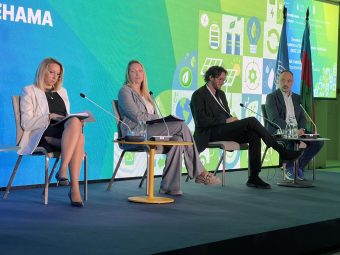On the eve of this year’s UN global conference on climate change – COP29, the fourth “Dialogue on Climate Change – Third Generation of Climate Ambitions” was held in Azerbaijan. The event was organized in the Sava Center in cooperation with the Ministry of Environmental Protection, the United Nations (UN) in Serbia and the United Nations Development Program (UNDP).
The participants of the event discussed how Serbia can further reduce greenhouse gas (GHG) emissions and adapt to the new climate reality in order to become more resistant to climate change, while at the same time using the green transition for the further development of the economy and society. These topics were discussed in the light of the official data of the Republic Hydrometeorological Institute, which show that the summer of 2024 is the hottest in Serbia since the beginning of measurements, with an average temperature that was higher by 3oC.
Representatives of competent ministries in the Government of Serbia, international development partners, domestic and international financial institutions, businesses, as well as UN agencies in Serbia participated in the Dialogue.
Sandra Dokic, state secretary in the Ministry of Environmental Protection, pointed out that passessments show that Serbia is warming more and faster than the global average. If ambitious actions are not taken at the global level to reduce greenhouse gas emissions, by the end of the century the temperature can be expected to increase by as much as 5.8 oC in our country.
According to her, Serbia is extremely vulnerable to climate change, and the Program for Adaptation to Changed Climate Conditions defines 25 priority measures that are necessary to reduce future losses and improve society’s readiness for climate risks, especially in the sector of agriculturewhere damages in previous years were extremely high.
As she stated, since 2000, the minimal material damages and losses that occurred as a result of extreme weather events in Serbia have been estimated at at least 6.8 billion euros, of which droughts and high temperatures are responsible for more than 70 percent.
Plamena Halačeva, deputy head of the EU Delegation in Serbia, said that the EU continues to support the implementation of the Green Agenda, in order to help Serbia respond to climate change and decarbonize the economy, according to the UNDP report.
“We support the improvement of the legislative framework and public policies, we invest in the improvement of people’s skills and in the innovation of small and medium-sized enterprises that contribute to a fair green transition, as well as in the reduction of emissions in the field of energy, transport and agriculture by switching to renewable energy sources, improving energy efficiency and encouraging sustainable agriculture Halačeva pointed out and added that, thanks to the Green Deal, the EU will meet the goal of reducing its net GHG emissions by at least 55 percent by 2030 compared to 1990 levels.
As stated in the UNDP Report, the Dialogue discussed how the improvement of public policies can contribute to Serbia’s adaptation to climate change and greater use of renewable energy sources for which there is potential in the country, such as geothermal energy and biomethane.
“We have set as a goal that by 2030, almost every second megawatt-hour will be produced from renewable sources. By then, a total of around 3.5 GW of new RES capacities will be added to the grid, from public and private investments. Together with a significant increase in energy efficiency in households and public buildings, by the end of the decade emissions of harmful gases should be 40.3 percent less than in 1990,” said Jovana Joksimović, Assistant Minister of Mining and Energy for International Cooperation and EU Integration.
She stated that, thanks to the completed desulphurization plants in TE Kostolac B and Tent A, and after the construction of the same plant for Tent B, more than 90 percent of the thermal capacity in Serbia will be completely environmentally acceptable at the level of European standards, which means better air quality.

How she stood out State Secretary Dokić, it is important how adaptation measures to climate change are implemented, that is, we must not use significantly more energy in order to adapt. As an example, she cited higher electricity consumption during the summer period due to the use of cooling devices. As another sector that suffers a lot due to climate change, the state secretary mentioned tourism, especially during winter days. As an example, she cited increasingly frequent periods without snow in the mountains, which is why artificial snow is produced, which again consumes a lot of energy.
That is why, as she stated, a regulation was foreseen through the adaptation program itself, which will see how all these measures are implemented.
The special focus of the Dialogue was the issue of securing stable sources of financing for the implementation of the green transition, so that the economy would continue to grow while preserving the environment and improving the quality of life of citizens.
The dialogue was organized on the eve of the 29th Conference of Member States of the UN Framework Convention on Climate Change – COP 29, which is being held from November 11 to 22 in Baku. The focus of this year’s conference will be the joint efforts of countries to limit global warming and adapt to the impact of climate change, as well as providing financing to achieve these goals.
Energy portal
Source: energetskiportal.rs


